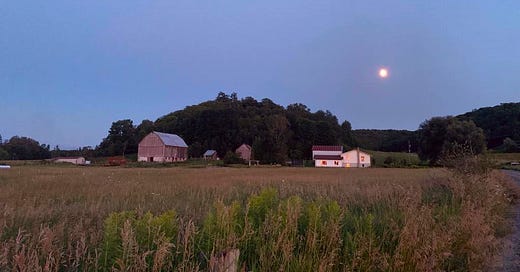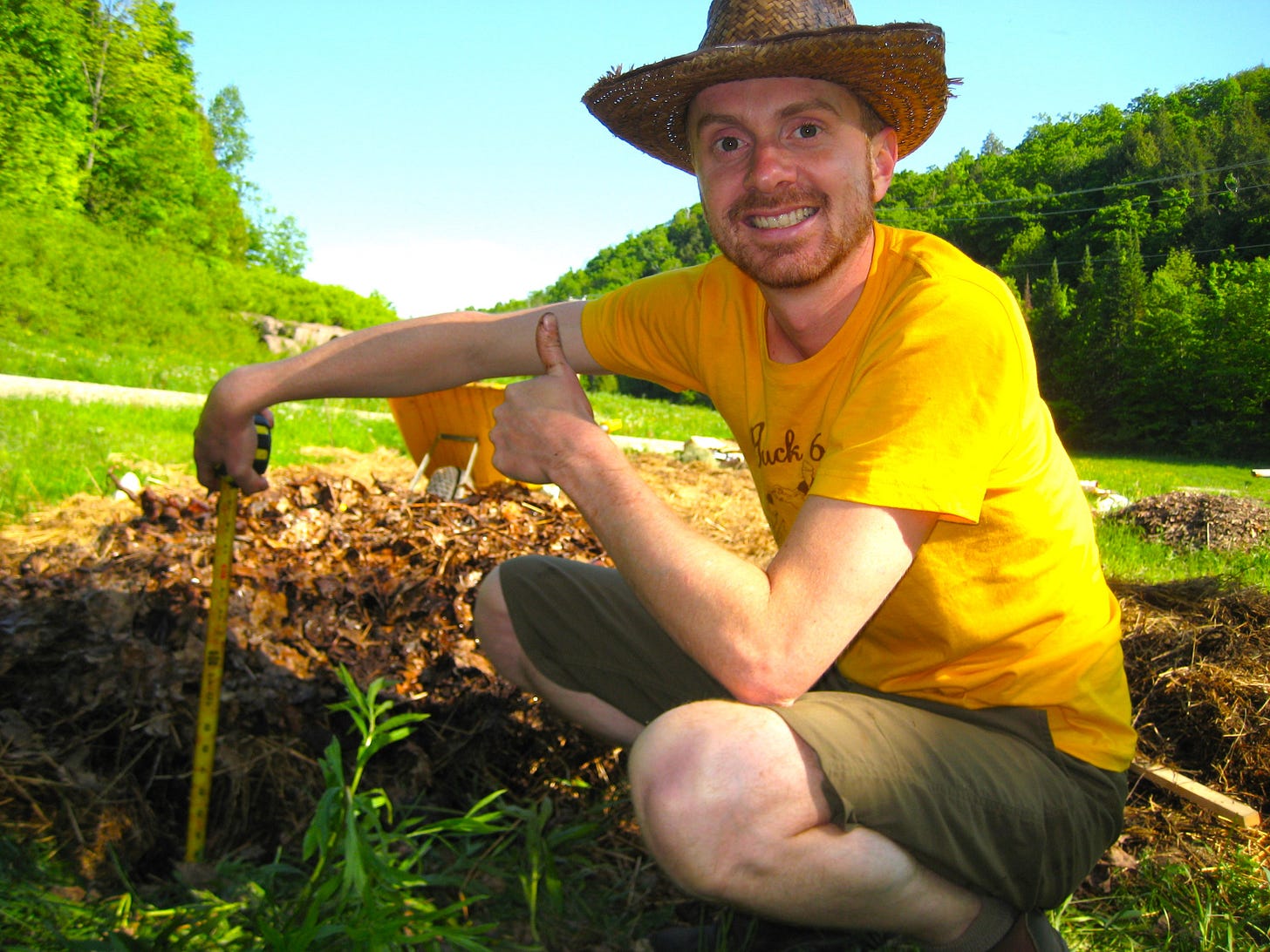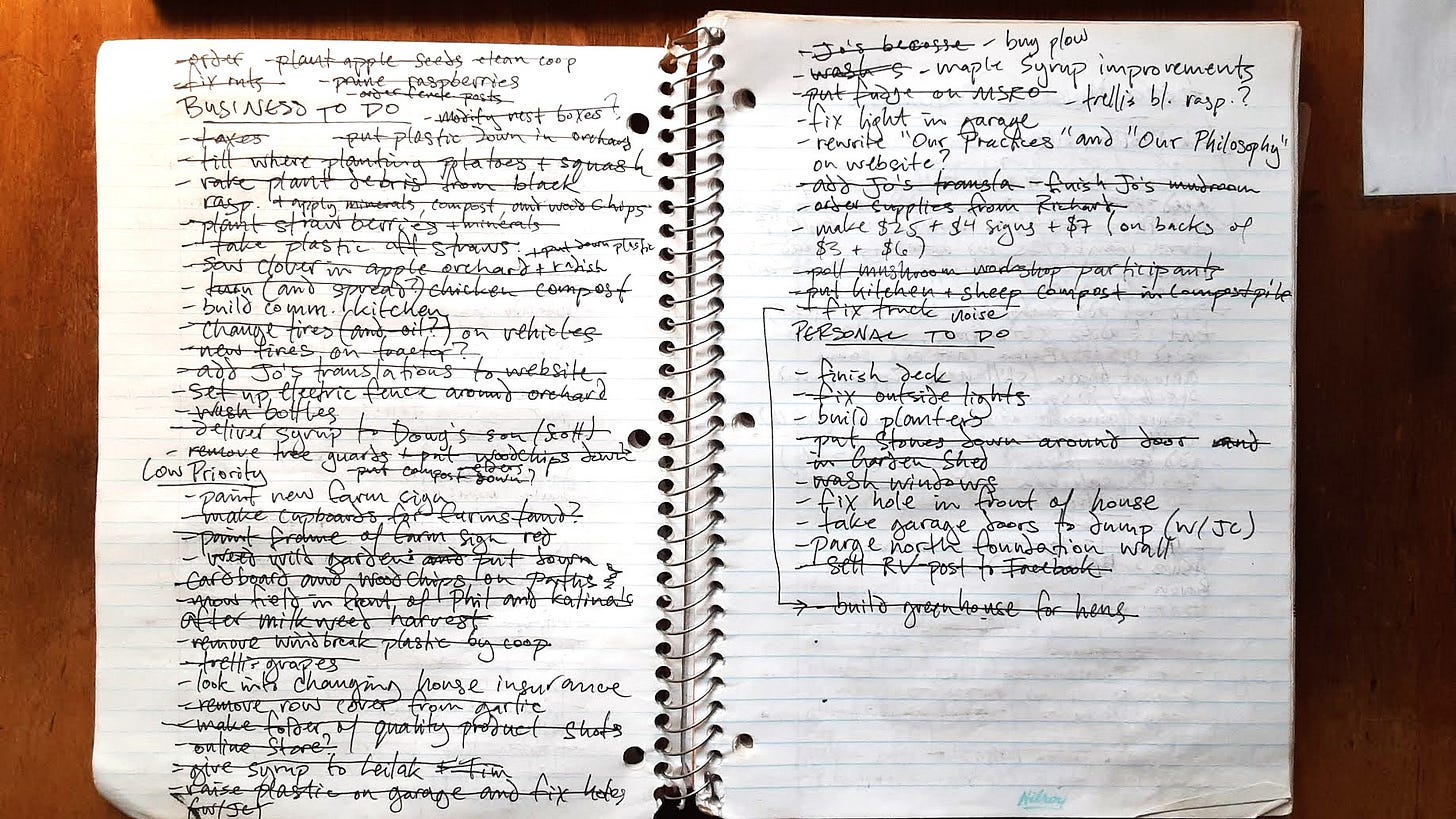Welcome to 2025, Farmer’s Table readers! To match the introspection of the season, and the relative lack of much happening on the farm, I’m planning a pair of essays. The first will be about my personal quirks and traits that eventually (after 38 years of existence) found a good match in the life of a farmer. What was it about farming that first attracted me, and why did it take me so long to figure out we were a good fit? The second will look at how these idiosyncrasies helped shape the kind of farm we’ve created here at Ferme et Forêt. Every farm, just like every small business, is an expression of the people who run it, and we’ve crafted our own unique way to create value for humans from the land (much if it through foraging, which is not even considered farming).
So, what did draw me to farming in the first place? The joke I like to make is that at first I wanted to be an artist, but then I decided I needed a more lucrative career, so I chose farming.
The truth is that, although I was attracted to music, visual arts, writing, photography, dance, and film-making (and spent three years in a post secondary film program), I ultimately found all of those lacked a certain concreteness that I needed to feel my efforts contributing towards. I always asked myself: what is the point of art? Although I could (and can) give certain answers (to expand the mind into new possibilities, to foster empathy, to delight, etc.) none of them were satisfactory to me. Perhaps I am overly practical, but the first thing that attracted me to farming was that I need to see my efforts translated in a timely fashion into tangible things of obvious value. And what is of more unquestionable value than the food we all need to eat every day to stay alive?
So at the age of 33, I gave up on creating art, and began thinking more about creating food. I had always liked gardening, and thought about taking that to the next level, but everything I heard about farming was that it was impossible to make a living at. Fortunately, I had the good luck to befriend several young local farmers who were actually paying their bills farming (shout out to Juniper Farm, Roots and Shoots, and Grazing Days!). So the example set by others was key to getting me into growing food for a living. And through these same connections (shout out to the Otesha Project!), I met my future wife, who also nurtured a dream of starting a farm. Starting a farm by yourself is a hard row to hoe.
My interest in gardening was an outgrowth of my love of good food, which was a gift from my dad. While he has never cared much whether his food is local and organic or not, he did instill in me from a young age, both through his home cooking and visits to restaurants, an appreciation for food. I worked in restaurants as a young man, but the intense stress typical of that profession never appealed to me. Farming offers a much calmer living for the food obsessed than cooking.
I remember the moment when I first realized that I could be happy farming. I was living in the top of a converted barn, coincidentally right next to the farm I would later purchase. I had taken a permaculture design course the year before, and was letting all the inspiration from that two week experience flow onto the land I was now a tenant on. I was harvesting rainwater off my barn roof, channeling that into an old cistern I had patched up, then gravity feeding that water down to two half-moon shaped ponds I had dug, just uphill from the new deep mulch garden I had installed. I was walking in the sun, feeling completely at peace with the world, and I thought, “I’d like to do this for the rest of my life.” My base level day to day anxiety had melted away. Farming can sometimes be an almost meditative practice that, unlike most jobs, actually relaxes the nervous system as you work.
I had always leaned in to the life of the mind, but here I was reveling in using my body. “Oh yeah, I guess I have a body,” I thought, “and it turns out I like to move it.” The thing about growing food (and especially about permaculture, which attracted me for a time) is that it does take a fair amount of intellect to do well – but also a lot of body. Farming is a good blend between thinking and moving.
I had also been an environmentalist for as long as I had any understanding of the term. In high school I made artwork about Amazonian deforestation, and became a vegetarian. I railed against factory farming and chemical agriculture. But beyond protesting, farming gave me the opportunity to actually put my ideas into practice. Instead of advocating for other farmers to give up their destructive habits, I could be the custodian of a patch of land on which I could apply all the healing salves I believed were needed – both for the land and our bodies. Farming put my environmental beliefs into action.
My environmentalism had grown out of a deep love for nature. So an added benefit of farming was that it allowed me to work with plants and animals on a daily basis. I was in a dance with nature, where I would make one move, and nature would react, and vice versa. It offered a connection to the land and the seasons I had never had before. It was far more interesting to work with dynamic living beings than dead machines or abstract concepts. And working with plants and animals (and don’t forget fungi!) was better for my introverted self than working with other people – although if I had been more comfortable with that, I could see that being equally interesting; there seem to be a lot of people who are drawn to both farming and teaching, and that makes sense. They both partner with life.
I had also always chaffed under the need to work for bosses in jobs. By my count, I held over 50 different jobs before I started a farm business in my late 30’s – everything from bartending to treeplanting to helping kids learning French. I never much liked any of them, and rare was the job I stayed in for more than a few months. There was just something intrinsically demotivating about someone else imposing their desires on my precious time and energy. I hated feeling like someone else’s tool. School had been the same for me: I disliked being taught, but loved to learn; I had a lot of self-motivation. So the independence of being my own boss was perfect for me. And unlike many businesses, where you could say that the customer becomes your boss, with farming I basically just grow what I want to grow and hope people want it (and so far they do). Farming can offer a level of freedom that few entrepreneurial efforts can match.
One typical drawback of being an entrepreneur is the lack of financial security, at least in the beginning. For many, this is a deal breaker. But for whatever reason (perhaps being raised in a middle class family that never had a lot of money but also never felt financially imperiled), I’ve never been very worried about going broke. My material needs are low, and I lived contentedly for many years on an income most would consider paltry. So while farming is a notoriously difficult livelihood with which to make ends meet, its financial insecurity has never bothered me. It’s a step up from art, at least!
One final attribute of farming that attracted me was the variety of work it entails. I’ve always been a generalist – a “jack of all trades, master of none”. I am interested in many things – too interested to ever devote myself fully to any one of them. I would get bored doing the same thing every day. Farming demands an almost overwhelming diversity of skills. From biology, to building, mechanics, bookkeeping, promotions, human resources, customer relations, meteorology, and much more, running a successful farm business will test you in a fascinating variety of ways. No two days – or seasons – are ever alike.
Not everything that originally attracted me to farming has panned out. As I wrote about in a previous essay, my dream of creating a thriving permaculture farm that would be an example to the world of how we could transform agriculture, from one of the most ecologically destructive things humans do to one of the most fecund, soon ran aground on the shoals of reality. And there are some parts of farming I don’t particularly enjoy, like the fact that your busiest season tends to coincide with the time when everyone else is on vacation, enjoying life by a lake. But it did also come with unexpected benefits, such as the incredible community of like-minded farmers around here I’ve been able to become a part of.
Joel Salatin, the famous Virginian farmer, calls himself a “Christian libertarian environmentalist capitalist lunatic farmer.” I guess I would call myself a practical, meditative, food obsessed, embodied, intellectual, environmentalist, introverted, independent, intrinsically motivated, financially agnostic, generalist farmer. This work offers different attractions to different people. To some it might be the thrill of driving around a 500 horsepower tractor, to others it might be tilling fields with actual horses. The domain of producing crops from the land is vast enough to accommodate many personality types. Even ex-artsy people like me.








Remarkable, Sean! Thank you for sharing, and for bringing inspiration and encouragement when the world around us seems to be heading in such a crazy direction. Good food, too. Joan
Nice piece, Sean. It took a lot of trial and error but you finally found your calling. And if I instilled a love of food, that's great, too.